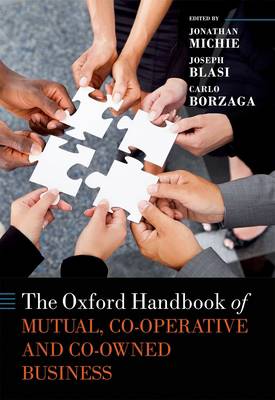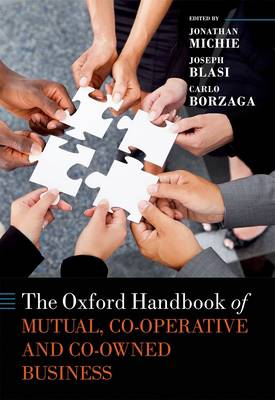
Bedankt voor het vertrouwen het afgelopen jaar! Om jou te bedanken bieden we GRATIS verzending (in België) aan op alles gedurende de hele maand januari.
- Afhalen na 1 uur in een winkel met voorraad
- In januari gratis thuislevering in België
- Ruim aanbod met 7 miljoen producten
Bedankt voor het vertrouwen het afgelopen jaar! Om jou te bedanken bieden we GRATIS verzending (in België) aan op alles gedurende de hele maand januari.
- Afhalen na 1 uur in een winkel met voorraad
- In januari gratis thuislevering in België
- Ruim aanbod met 7 miljoen producten
Zoeken
Oxford Handbook of Mutual, Co-Operative, and Co-Owned Business
Jonathan Michie
€ 322,45
+ 644 punten
Omschrijving
The Oxford Handbook of Mutual, Co-Operative, and Co-Owned Business investigates all types of 'member owned' organizations, whether consumer co-operatives, agricultural and producer co-operatives, worker co-operatives, mutual building societies, friendly societies, credit unions, solidarity organizations, mutual insurance companies, or employee-owned companies. Such organizations can be owned by their consumers, the producers, or the employees - whether through single-stakeholder or multi-stakeholder ownership. This complex set of organizations is named differently across countries: from 'mutual' in the UK, to 'solidarity cooperatives' in Latin America. In some countries, such organizations are not even officially recognized and thus lack a specific denomination. For the sake of clarity, this Handbook will refer to member-owned organizations to encompass the variety of non-investor-owned organizations, and in the national case study chapters the terms used will be those most widely employed in that country. These alternative corporate forms have emerged in a variety of economic sectors in almost all advanced economies since the time of the industrial revolution and the development of capitalism, through the subsequent creation and dominance of the limited liability company. Until recently, these organizations were generally regarded as a rather marginal component of the economy. However, over the past few years, member-owned organizations have come to be seen in some countries, at least, as potentially attractive in light of their ability to tackle various economic and social concerns, and their relative resilience during the financial and economic crises of 2007-2017.
Specificaties
Betrokkenen
- Auteur(s):
- Uitgeverij:
Inhoud
- Aantal bladzijden:
- 698
- Taal:
- Engels
- Reeks:
Eigenschappen
- Productcode (EAN):
- 9780199684977
- Verschijningsdatum:
- 30/05/2017
- Uitvoering:
- Hardcover
- Formaat:
- Genaaid
- Afmetingen:
- 173 mm x 249 mm
- Gewicht:
- 1383 g

Alleen bij Standaard Boekhandel
+ 644 punten op je klantenkaart van Standaard Boekhandel
Beoordelingen
We publiceren alleen reviews die voldoen aan de voorwaarden voor reviews. Bekijk onze voorwaarden voor reviews.









